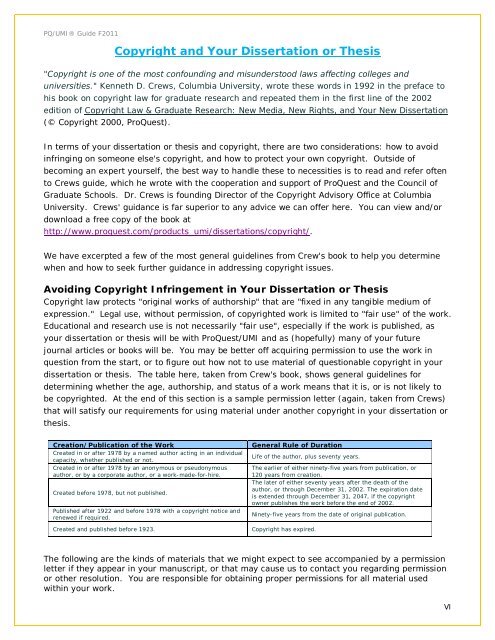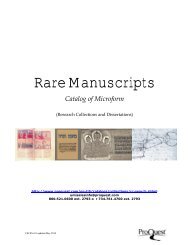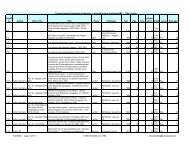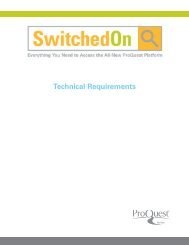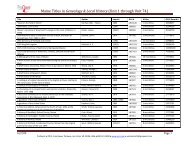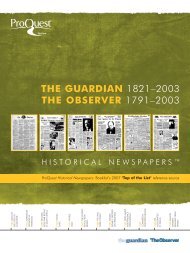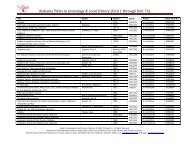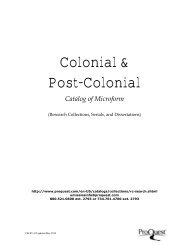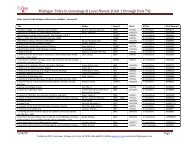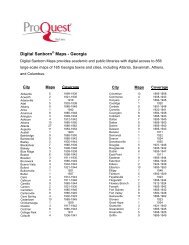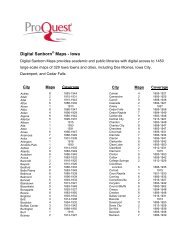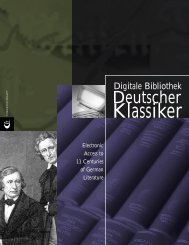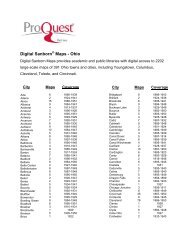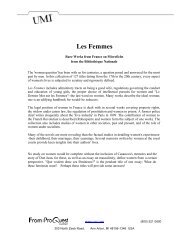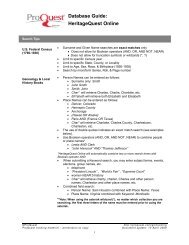ProQuest - Copyright and Your Dissertation or Thesis - Umi.com
ProQuest - Copyright and Your Dissertation or Thesis - Umi.com
ProQuest - Copyright and Your Dissertation or Thesis - Umi.com
Create successful ePaper yourself
Turn your PDF publications into a flip-book with our unique Google optimized e-Paper software.
PQ/UMI® Guide F2011<br />
<strong>Copyright</strong> <strong>and</strong> <strong>Your</strong> <strong>Dissertation</strong> <strong>or</strong> <strong>Thesis</strong><br />
"<strong>Copyright</strong> is one of the most confounding <strong>and</strong> misunderstood laws affecting colleges <strong>and</strong><br />
universities." Kenneth D. Crews, Columbia University, wrote these w<strong>or</strong>ds in 1992 in the preface to<br />
his book on copyright law f<strong>or</strong> graduate research <strong>and</strong> repeated them in the first line of the 2002<br />
edition of <strong>Copyright</strong> Law & Graduate Research: New Media, New Rights, <strong>and</strong> <strong>Your</strong> New <strong>Dissertation</strong><br />
(© <strong>Copyright</strong> 2000, <strong>ProQuest</strong>).<br />
In terms of your dissertation <strong>or</strong> thesis <strong>and</strong> copyright, there are two considerations: how to avoid<br />
infringing on someone else's copyright, <strong>and</strong> how to protect your own copyright. Outside of<br />
be<strong>com</strong>ing an expert yourself, the best way to h<strong>and</strong>le these to necessities is to read <strong>and</strong> refer often<br />
to Crews guide, which he wrote with the cooperation <strong>and</strong> supp<strong>or</strong>t of <strong>ProQuest</strong> <strong>and</strong> the Council of<br />
Graduate Schools. Dr. Crews is founding Direct<strong>or</strong> of the <strong>Copyright</strong> Advis<strong>or</strong>y Office at Columbia<br />
University. Crews' guidance is far superi<strong>or</strong> to any advice we can offer here. You can view <strong>and</strong>/<strong>or</strong><br />
download a free copy of the book at<br />
http://www.proquest.<strong>com</strong>/products_umi/dissertations/copyright/.<br />
We have excerpted a few of the most general guidelines from Crew's book to help you determine<br />
when <strong>and</strong> how to seek further guidance in addressing copyright issues.<br />
Avoiding <strong>Copyright</strong> Infringement in <strong>Your</strong> <strong>Dissertation</strong> <strong>or</strong> <strong>Thesis</strong><br />
<strong>Copyright</strong> law protects "<strong>or</strong>iginal w<strong>or</strong>ks of auth<strong>or</strong>ship" that are "fixed in any tangible medium of<br />
expression." Legal use, without permission, of copyrighted w<strong>or</strong>k is limited to "fair use" of the w<strong>or</strong>k.<br />
Educational <strong>and</strong> research use is not necessarily "fair use", especially if the w<strong>or</strong>k is published, as<br />
your dissertation <strong>or</strong> thesis will be with <strong>ProQuest</strong>/UMI <strong>and</strong> as (hopefully) many of your future<br />
journal articles <strong>or</strong> books will be. You may be better off acquiring permission to use the w<strong>or</strong>k in<br />
question from the start, <strong>or</strong> to figure out how not to use material of questionable copyright in your<br />
dissertation <strong>or</strong> thesis. The table here, taken from Crew's book, shows general guidelines f<strong>or</strong><br />
determining whether the age, auth<strong>or</strong>ship, <strong>and</strong> status of a w<strong>or</strong>k means that it is, <strong>or</strong> is not likely to<br />
be copyrighted. At the end of this section is a sample permission letter (again, taken from Crews)<br />
that will satisfy our requirements f<strong>or</strong> using material under another copyright in your dissertation <strong>or</strong><br />
thesis.<br />
Creation/Publication of the W<strong>or</strong>k<br />
Created in <strong>or</strong> after 1978 by a named auth<strong>or</strong> acting in an individual<br />
capacity, whether published <strong>or</strong> not.<br />
Created in <strong>or</strong> after 1978 by an anonymous <strong>or</strong> pseudonymous<br />
auth<strong>or</strong>, <strong>or</strong> by a c<strong>or</strong>p<strong>or</strong>ate auth<strong>or</strong>, <strong>or</strong> a w<strong>or</strong>k-made-f<strong>or</strong>-hire.<br />
Created bef<strong>or</strong>e 1978, but not published.<br />
Published after 1922 <strong>and</strong> bef<strong>or</strong>e 1978 with a copyright notice <strong>and</strong><br />
renewed if required.<br />
Created <strong>and</strong> published bef<strong>or</strong>e 1923.<br />
General Rule of Duration<br />
Life of the auth<strong>or</strong>, plus seventy years.<br />
The earlier of either ninety-five years from publication, <strong>or</strong><br />
120 years from creation.<br />
The later of either seventy years after the death of the<br />
auth<strong>or</strong>, <strong>or</strong> through December 31, 2002. The expiration date<br />
is extended through December 31, 2047, if the copyright<br />
owner publishes the w<strong>or</strong>k bef<strong>or</strong>e the end of 2002.<br />
Ninety-five years from the date of <strong>or</strong>iginal publication.<br />
<strong>Copyright</strong> has expired.<br />
The following are the kinds of materials that we might expect to see ac<strong>com</strong>panied by a permission<br />
letter if they appear in your manuscript, <strong>or</strong> that may cause us to contact you regarding permission<br />
<strong>or</strong> other resolution. You are responsible f<strong>or</strong> obtaining proper permissions f<strong>or</strong> all material used<br />
within your w<strong>or</strong>k.<br />
VI
PQ/UMI® Guide F2011<br />
• Long quotations from pre-existing materials that extend f<strong>or</strong> m<strong>or</strong>e than one <strong>and</strong> one-half singlespaced<br />
pages.<br />
• Reproduced publications. Examples include copies of st<strong>and</strong>ard survey instruments <strong>or</strong><br />
questionnaires <strong>and</strong> journal articles. This applies even if you are the auth<strong>or</strong> of the <strong>or</strong>iginal w<strong>or</strong>k,<br />
as the <strong>or</strong>iginal publisher may have acquired copyright.<br />
• Unpublished materials. Extensive reference to unpublished w<strong>or</strong>ks raises a variety of issues<br />
about copyright <strong>and</strong> about privacy <strong>and</strong> access to collections.<br />
• Poetry <strong>and</strong> Music Lyrics. Fair use f<strong>or</strong> highly creative w<strong>or</strong>ks is relatively limited. Lengthy<br />
excerpts will raise critical questions. Some publishers require permission f<strong>or</strong> all quotations from<br />
poems.<br />
• Dialogue from a play, screenplay, broadcast, <strong>or</strong> novel. While fair use is relatively narrow f<strong>or</strong><br />
creative <strong>and</strong> fictional w<strong>or</strong>ks, it should allow brief quotations in the context of scholarly critiques.<br />
• Music. Excerpts in your dissertation should be brief <strong>and</strong> should be closely tied to your research<br />
objectives.<br />
• Graphic <strong>or</strong> pict<strong>or</strong>ial w<strong>or</strong>ks. The material should be closely related to your research objectives,<br />
tied to critical analysis, <strong>and</strong> not supersede the market f<strong>or</strong> the <strong>or</strong>iginal.<br />
• Computer Software. <strong>Dissertation</strong>s embodied in new media, such as on a website <strong>or</strong> on CD-<br />
ROM, may inc<strong>or</strong>p<strong>or</strong>ate reader programs <strong>or</strong> other application software to make the new w<strong>or</strong>k<br />
accessible <strong>or</strong> useful. Reproducing such programs to ac<strong>com</strong>pany your dissertation will almost<br />
invariably require permission. Consult any license agreement that may apply to the programs,<br />
<strong>and</strong> prepare to seek permission from the copyright owner. "Shareware" is also not necessarily<br />
freely available f<strong>or</strong> copying. Shareware is a protected w<strong>or</strong>k made available under generous <strong>or</strong><br />
lenient licensing terms; read the license carefully bef<strong>or</strong>e integrating the program into your<br />
dissertation.<br />
• Sources located on the Internet. Easy availability does not change copyright status. Materials<br />
on the Web are protected by copyright just as if they appeared in a book <strong>or</strong> on tape.<br />
Protecting <strong>Your</strong> Own <strong>Copyright</strong><br />
<strong>Copyright</strong> privileges now vest immediately upon creating your w<strong>or</strong>k, without the requirement of<br />
notice <strong>or</strong> registration. However, you should still include a copyright notice on your dissertation.<br />
<strong>Your</strong> graduate school may even require that you do. Typical copyright notices take this f<strong>or</strong>m:<br />
<strong>Copyright</strong> 2011, Jane Student <strong>or</strong> © 2011, Jane Student. The notice should appear in a<br />
conspicuous location, customarily just after the title page.<br />
Registration is also technically optional, but still re<strong>com</strong>mended. It establishes a public rec<strong>or</strong>d of<br />
your dissertation <strong>and</strong> copyright. In the U.S., registration is required bef<strong>or</strong>e you can file an<br />
infringement lawsuit. You should theref<strong>or</strong>e register bef<strong>or</strong>e that possibility ever arises then hope it<br />
never does. Registration also allows you to be awarded damages <strong>and</strong> att<strong>or</strong>ney fees in an<br />
infringement action. Generally, you must have registered bef<strong>or</strong>e the infringement occurs to have<br />
these benefits.<br />
Because of the availability of content on the open web via reposit<strong>or</strong>ies <strong>and</strong> other avenues,<br />
registering f<strong>or</strong> U.S. copyright can be a significant benefit f<strong>or</strong> the protection of your w<strong>or</strong>k. F<strong>or</strong> only<br />
$55, you can protect your dissertation <strong>or</strong> master’s thesis <strong>and</strong> be<strong>com</strong>e immediately eligible f<strong>or</strong><br />
statut<strong>or</strong>y damages <strong>and</strong> att<strong>or</strong>ney fees. Registering f<strong>or</strong> copyright allows f<strong>or</strong> the claimant to receive<br />
VII
PQ/UMI® Guide F2011<br />
statut<strong>or</strong>y damages set out in Title 17, Section 504 of the U.S. Code, which range from $750 –<br />
$150,000, plus att<strong>or</strong>ney fees, per copyright infraction. This contrasts with those who do not<br />
register f<strong>or</strong> copyright – auth<strong>or</strong>s without copyright registration can claim only actual damages <strong>and</strong><br />
no att<strong>or</strong>ney fees.<br />
Sample Permission Letter f<strong>or</strong> Use of Previously <strong>Copyright</strong>ed Material<br />
Modified from Crews, Kenneth D. 2000. <strong>Copyright</strong> Law & Graduate Research: New Media, New Rights, <strong>and</strong> <strong>Your</strong> New<br />
<strong>Dissertation</strong> http://www.proquest.<strong>com</strong>/products_umi/dissertations/copyright/<br />
[Letterhead stationery <strong>or</strong> return address]<br />
[Date]<br />
[Name <strong>and</strong> address of addressee]<br />
Dear _______:<br />
I am <strong>com</strong>pleting a doct<strong>or</strong>al dissertation at __________ University entitled "__________." I would like your<br />
permission to reprint in my dissertation excerpts from the following:<br />
[Insert full citation <strong>and</strong> description of the <strong>or</strong>iginal w<strong>or</strong>k.]<br />
The excerpts to be reproduced are: [insert detailed explanation <strong>or</strong> attach copy].<br />
The requested permission extends to any future revisions <strong>and</strong> editions of my dissertation, including nonexclusive<br />
w<strong>or</strong>ld rights in all languages, <strong>and</strong> to the prospective publication of my dissertation by <strong>ProQuest</strong><br />
through its UMI ® <strong>Dissertation</strong> Publishing business. <strong>ProQuest</strong> may produce <strong>and</strong> sell copies of my dissertation on<br />
dem<strong>and</strong> <strong>and</strong> may make my dissertation available f<strong>or</strong> free internet download at my request. These rights will in<br />
no way restrict republication of the material in any other f<strong>or</strong>m by you <strong>or</strong> by others auth<strong>or</strong>ized by you. <strong>Your</strong><br />
signing of this letter will also confirm that you own [<strong>or</strong> your <strong>com</strong>pany owns] the copyright to the abovedescribed<br />
material.<br />
If these arrangements meet with your approval, please sign this letter where indicated below <strong>and</strong> return it to<br />
me in the enclosed return envelope. Thank you very much.<br />
Sincerely,<br />
[<strong>Your</strong> name <strong>and</strong> signature]<br />
PERMISSION GRANTED FOR THE<br />
USE REQUESTED ABOVE:<br />
__________________________<br />
[Type name of addressee below signature line]<br />
Date: ____________________<br />
VIII
PQ/UMI® Guide F2011<br />
Instructions f<strong>or</strong> permission letters:<br />
1. Be sure to include your return address, telephone <strong>and</strong> fax numbers, <strong>and</strong> date at the top of<br />
the letter.<br />
2. Spare no eff<strong>or</strong>t in confirming the exact name <strong>and</strong> address of the addressee. Call the person<br />
to confirm the copyright ownership.<br />
3. State clearly the name of your university <strong>and</strong> your dissertation's title.<br />
4. Describe precisely the proposed use of the copyrighted material. If necessary <strong>or</strong><br />
appropriate, attach a copy of the quotations, diagrams, pictures, <strong>and</strong> other materials. If the<br />
proposed use is extensive, such as the general use of an archival <strong>or</strong> manuscript collection,<br />
describe it in broad <strong>and</strong> sweeping terms. <strong>Your</strong> objectives are to eliminate any ambiguities<br />
<strong>and</strong> to ensure that the permission en<strong>com</strong>passes the full scope of your needs.<br />
5. The sample signature f<strong>or</strong>m at the end of the sample letter is appropriate when an individual<br />
grants the permission. When a <strong>com</strong>pany, such as a publishing house, is granting<br />
permission, use the following signature f<strong>or</strong>mat:<br />
PERMISSION GRANTED FOR THE<br />
USE REQUESTED ABOVE:<br />
[Type name of <strong>com</strong>pany]<br />
By: ________________________________<br />
Title: ______________________________<br />
Date: ________________<br />
6. F<strong>or</strong> M<strong>or</strong>e Inf<strong>or</strong>mation about Permissions. Various <strong>or</strong>ganizations grant permissions f<strong>or</strong> certain<br />
w<strong>or</strong>ks. F<strong>or</strong> example, the <strong>Copyright</strong> Clearance Center offers a "Republication Licensing<br />
Service" that may prove helpful: www.copyright.<strong>com</strong>.<br />
IX


